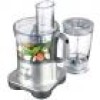DeLonghi DFP250 Owner Manual - Page 6
Choosing A Speed For All Functions - blender
 |
View all DeLonghi DFP250 manuals
Add to My Manuals
Save this manual to your list of manuals |
Page 6 highlights
Always switch off before removing the lid. Important - Your processor is not suitable for crushing or grinding cof- fee beans, or converting granulated sugar to superfine sugar. - When adding almond extract or flavoring to mixtures avoid contact with the plastic as this may result in permanent marking. To use your blender 1 Put your ingredients into the carafe. 2 Fit the lid onto the carafe and turn clockwise to lock (4). Fit the filler cap. 3 Place the blender into the power unit and turn to lock (5). 4 Select a speed or use the pulse control. Hints - When making mayonnaise, put all the ingredients, except the oil into the blender. Then with the machine running, pour the oil into the filler cap and let it run through. - Thick mixtures, e.g. pates and dips, may need scraping down. If it's difficult to process, add more liquid. - When crushing ice use the pulse in short bursts. Important - Allow all liquids to cool to room temperature before placing them in the blender. - To ensure the long life of your blender, never run it for longer than 60 seconds. Switch off as soon as you've got the right consistency. - Don't process spices - they may damage the plastic. - The machine won't work if the blender is fitted incorrectly. - Don't put dry ingredients into the blender before switching on. If necessary, cut them into pieces; remove the filler cap; then with the machine running, drop them through one by one. - Don't use the blender as a storage container. Keep it empty before and after use. - Never blend more than 1.2 litres - less for frothy liquids like milkshakes. CHOOSING A SPEED FOR ALL FUNCTIONS tool/attachment function speed knife blade dough tool whisk discs - slicing/ shredding rasping disc citrus press blender Cake making 1 - 2 Rubbing butter into flour 2 Adding water to combine pastry ingredients 1 - 2 Chopping/pureeing/pâtés 2 Thick soup mixes (500mls liquid to 500g dry ingredients) 1 Thinner soup mixes/ milk (max 600mls) 1 - 2 Yeasted dough mixes 2 Egg whites 2 Cream (max 250mls) 1 - 2 Firm food items such as carrots, hard cheeses 2 Softer items such as cucumbers, tomatoes 1 Parmesan cheese, Potatoes for potato dumplings 2 Citrus fruits 1 All processing 2 Maximum capacities - Shortcrust pastry Flour wt - Yeast dough Flour wt - One Cake Total wt - Chopping lean meat Total wt - Thick soup mixes Thinner soup mix/milk - Whisk egg white - Blender 250g/9oz 340g/12oz 1Kg/2lb 4oz 400g/14oz 1 litre 600mls 4 1.2 litres USING THE ATTACHMENTS See chart above for speed of each attachment. (L) knife blade/(M) dough tool The knife blade is the most versatile of all the attachments. The length of the processing time will determine the texture achieved. For coarser textures use the pulse control. Use the knife blade for cake and pastry making, chopping raw and cooked meat, vegetables, nuts, pate, dips, pureeing soups and to also make crumbs from biscuits and bread. Use the dough tool for yeasted mixes. 6















